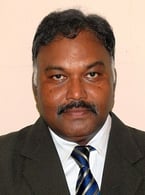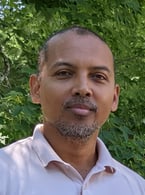Tutorial Speakers


Speaker: Prof. Samarendra Dandapat
Title: Machine Learning and Deep Learning Approaches for Cardiovascular Diagnosis
Machine learning (ML) and deep learning (DL) tools are increasingly gaining popularity within the biomedical community for automated detection of various cardiovascular disorders. In medical applications, ML methods attempt to cluster patient traits or infer the probability of the disease outcome. DL techniques use very large non-linear models and high computationally efficient machines such as GPUs are employed for their implementation. Cardiovascular disorders have three basic origins. They are conduction abnormalities, myocardial abnormalities and valve related abnormalities. These three abnormalities are interrelated and they lead to different cardiac disorders. In clinical settings, cardiovascular abnormalities are diagnosed using electrocardiogram (ECG) signal and phonocardiogram (PCG) signal, as well as medical context including patient symptoms, medical history, and risk factors. These pieces of information are generally found in electronic health records (EHR). Analysis of such data requires natural language processing (NLP) techniques to extract information from such as clinical notes/medical journals to supplement and enrich structural medical data. The challenges in this area include not only processing of time series data such as ECG and PCG but also analyzing the textual data. In this presentation, we will discuss the significance of diagnostic information in ECG signal, heart sound signal or Phonocardiogram (PCG) and electronic health records (EHR). The necessity for feature extraction will be highlighted. Some applications of state-of-art ML techniques in this area will be presented.
Brief Biography
Samarendra Dandapat is a faculty member in the department of EEE, IIT Guwahati, India since 1997. He received his Ph.D. degree from IIT Kanpur, M. Tech. degree from IIT BHU and B. Tech. Degree from MNNIT Allahabad, India. He was Head of the Department of EEE from 2005 to 2006, Dean Students Affairs from 2006 to 2008 and Dean Administration from 2009 to 2012 at IIT Guwahati. He was also the founder Dean of IIT Patna from 2008 to 2009. He was a visiting research fellow in NTU, Singapore from 2003 to 2004. He has served as member of BOG of IIT Guwahati, NIT Silchar, NERIST Itanagar and Regional Film and Television Institute Guwahati.
His research interests include Cardiovascular Signal Processing, Stressed Speech Processing and Fundus Image Processing. He has published around 100 journal papers and 130 conference papers. Prof. Dandapat has supervised 24 Ph. D. Thesis and 60 M. Tech. Thesis works.


Speaker: Prof. Prabir Barooah
Title: Optimization with Matlab coupled with CasADi and CVX
Optimisation is needed in virtually every field of engineering. Modern modelling tools such as CasADi and CVX (and many others) has significantly reduced the drudgery that used to be required in transcribing an optimization problem into a form that can be numerically solved. This tutorial will cover some basics of the theory of optimization that is required in practice (such as how to distinguish a convex problem from a non convex one), and then how to transcribe such problems using two specific modelling tools: CasADi and CVX. While CASADI is useful for both convex and non convex problems, CVX is for convex problems alone. The coding examples will be done vi Matlab, though these tools can be used with Python and Julia as well.
Note: This is not an introduction to matlab tutorial; you need to be comfortable with Matlab (or Python/Julia). Participants are required to come with a laptop with a working copy of Matlab, and are strongly advised to install casadi (from https://web.casadi.org) and cvx (from https://cvxr.com/cvx/doc/install.html) in their laptops and check that the installations work with matlab before coming to the tutorial.
Brief Biography
Prabir Barooah joined the Indian Institute of Technology, Guwahati, in July 2022. Previously he was a Professor of Mechanical and Aerospace Engineering at the University of Florida, Gainesville, Florida, USA. He received his Ph.D. in 2007 from the University of California, Santa Barbara. From 1999 to 2002 he was a research engineer at United Technologies Research Center, East Hartford, CT. He received the M. S. degree in Mechanical Engineering from the University of Delaware in 1999 and the B.Tech degree in Mechanical Engineering from the Indian Institute of Technology, Kanpur, in 1996. Dr. Barooah has won the Outstanding Researcher Award (2013) from American Society of Engineering Education (SE Section), CAREER award (2010) from the National Science Foudation (USA), General Chairs' Recognition Award for Interactive papers at the 48th IEEE Conference on Decision and Control (2009), the best paper award at the 2nd Int. Conf. on Intelligent Sensing and Information Processing (2005), and a NASA group achievement award (2003). His research interests include energy sustainability, efficiency and resiliency, data-driven learning and control, and decentralized coordination.